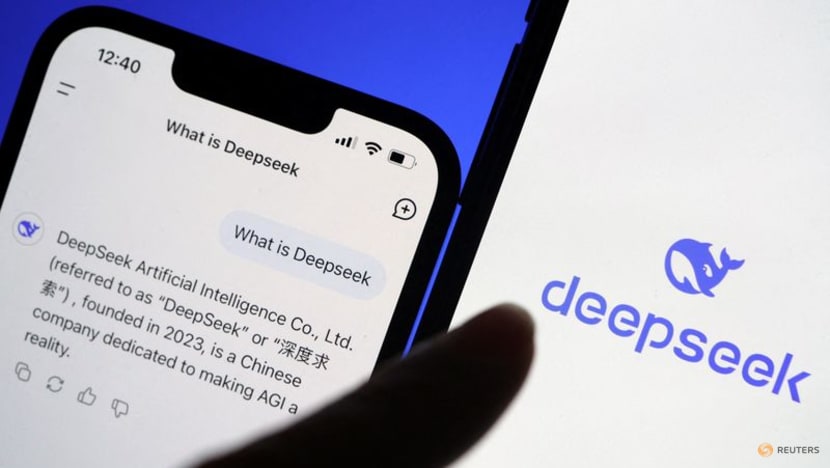As China's firms rush to adopt DeepSeek’s AI services, workers worry over impact on jobs
The hashtag “ask DeepSeek whether my job will be taken” has been trending on Chinese microblogging site Weibo, garnering close to 7.2 million views.

The logo of DeepSeek is displayed alongside its AI assistant app on a mobile phone, in this illustration picture taken on Jan 28, 2025. (File photo: Reuters/Florence Lo)
SINGAPORE: From telcos to automakers and even brokerages - Chinese companies and even local government bodies are flocking to integrate DeepSeek into their services, as public discussion grows over whether the breakout Chinese artificial intelligence (AI) app could impact livelihoods.
DeepSeek exploded onto the global AI scene last month, roiling stock markets and catapulting its founder Liang Wenfeng to international fame after its latest models appeared to match or even exceed industry-leading rivals in the United States for a fraction of the investment.
Since then, numerous Chinese firms cutting across sectors, including name brands, have hopped on the bandwagon amid an outpouring of national pride over the homegrown app’s success.
China’s “Big Three” telecom operators - China Mobile, China Unicom and China Telecom - have integrated DeepSeek’s AI models, mainly in their cloud services. So too have leading smartphone makers such as Huawei, Vivo and Oppo.
Tech giants have also followed suit. Tencent’s Weixin messaging app - which serves domestic users and is the sister app to WeChat - is allowing some users to search via DeepSeek’s AI model, while Baidu has said it will link up its search engine and AI chatbot Ernie Bot to DeepSeek.
Chinese automakers are also revving towards DeepSeek. More than a dozen of them, from electric vehicle leader BYD to startup Leapmotor, have announced plans to develop cars fitted with DeepSeek AI features, according to a Feb 16 report by the South China Morning Post (SCMP).
Meanwhile, Reuters reported that at least 20 Chinese brokers and fund managers have already started to integrate DeepSeek models in their businesses, potentially changing how they conduct research, manage risks, make investment decisions and interact with clients.
Chinese media have not delved into exactly why businesses are flocking to DeepSeek.
Not to be left out, local governments across China are also getting on board the DeepSeek train.
In Guangdong province, some cities - including Shenzhen, Guangzhou and Dongguan, have integrated the AI app into their online government services, according to SCMP. Others elsewhere have been holding training sessions to learn how to harness AI models like DeepSeek, to improve efficiency.
SEEKING OUT AND REPLACING JOBS?
But some moves have sparked concerns over the possible impact on jobs and livelihoods.
Shenzhen’s Futian district rolled out its first batch of “AI civil servants” based on DeepSeek’s R1 model earlier this month, according to local media reports. They have been handling tasks ranging from document processing, public services to emergency management and promoting investments.
According to Futian officials, the AI workforce has wrought immediate and major benefits - reducing the time needed for personalised content generation from five days to just a few minutes, cutting audit times by 90 per cent and being over 95 per cent accurate in formatting documents.
The announcement sparked debate on Chinese social media as netizens discussed whether DeepSeek - and AI in general - could soon come for their jobs, even “iron rice bowl” careers.
“Iron rice bowl” or “tie fan wan” in Chinese refers to an occupation with guaranteed job security and benefits, with work in the government and military typically falling under this.
The hashtag “ask DeepSeek whether my job will be taken” has been trending on Chinese microblogging site Weibo, garnering close to 7.2 million views as of Thursday (Feb 20).
“I thought in the age of AI, an ‘iron rice bowl’ would remain an ‘iron rice bowl’. But I didn’t realise the launch of an AI civil servant would thoroughly change my views, and it looks like now no job is safe,” one user wrote.
“Since we can’t stop the AI wave, guess we’ll have to embrace it. I think everyone should really try out jobs related to AI, after all it’s not going away anytime soon.”
Amid the debate, Futian officials have clarified that the digital employees are “assistants” and not “AI civil servants”.
Gao Zeng, deputy director of the Futian District Government Service Data Administration Bureau, said in a Tuesday article by Futian’s publicity department that the AI assistants cannot make decisions alone and have a designated human “guardian”.
Gao also described these models as being able to “assist in public management”, improve work efficiency and reduce the burden on a grassroots level.
Speaking to local news site ECNS, Meng Qingguo from Tsinghua University said DeepSeek is cost-effective with good performance, making it affordable for use in government affairs.
He added that being homegrown, the AI app also performs well in terms of Chinese processing, making it suitable for local use, including by the government.
Wang Peng, a researcher at the Beijing Academy of Social Sciences, said that the move by Futian district is an “active attempt to transform government affairs into an intelligent one”.
Quoted in the Futian publicity department article, Wang noted that in the future, more government departments and institutions may introduce AI to help improve work efficiency and service quality.
Wang also believes worries that AI will replace human jobs entirely are unfounded, at least for now.
Even though the use of AI may affect some traditional positions, it will also open up new employment opportunities, he said.


















